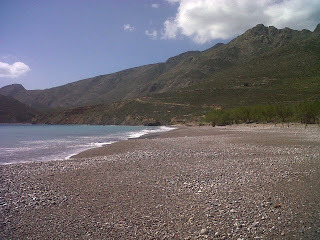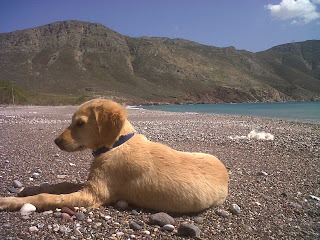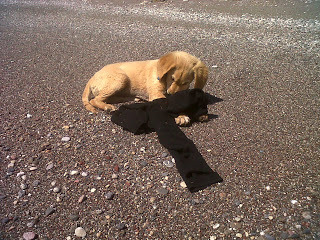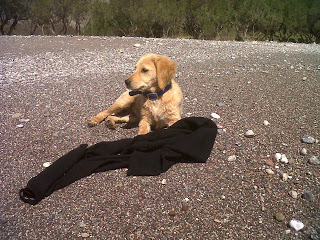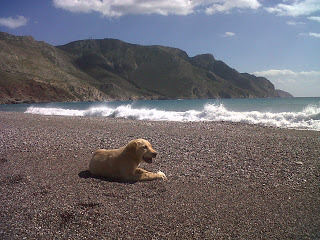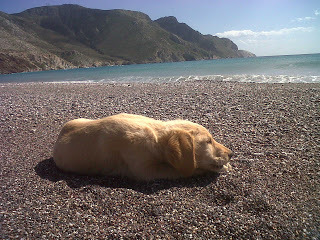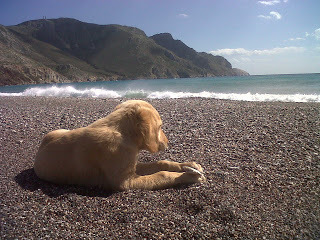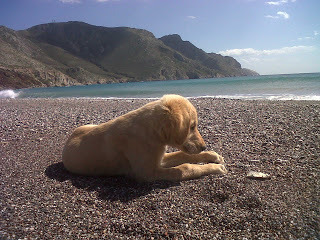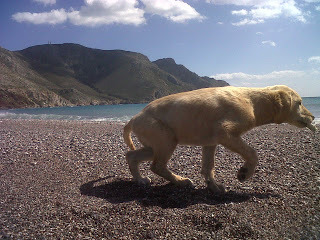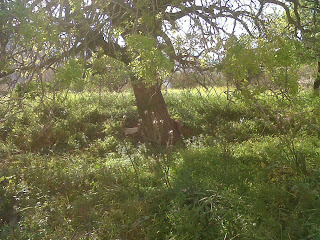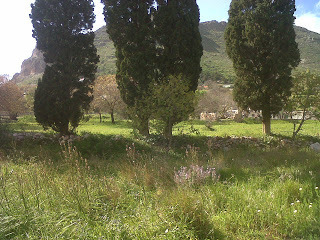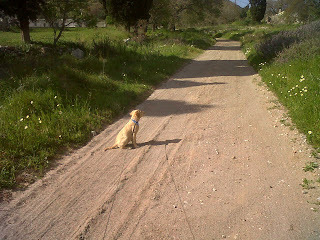Jennifer Barclay's Blog, page 13
May 18, 2013
Greek Drinking Songs (To Plataniotiko Nero)
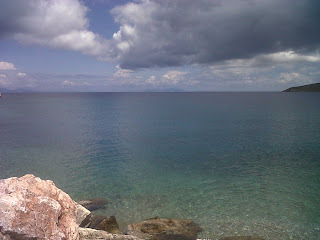
Sleepy this morning, after staying up late to watch Eurovision – or should I say #Eurovision, since it was the Twitter banter that made it fun. If you haven’t seen it, the video for the Greek Eurovision entry is hilarious – very different from what you’d expect. It gives a nicely irreverent image to counter what people read in the news about Greece. And unusually for Eurovision, it's not a love song but a drinking song.
[Apologies for the weird formatting issues in this post; I've tried to fix it so long it's giving me a headache. Hope it doesn't give you one.]
The video seems to have nothing to do with the title, 'Alcohol is Free', but the lyrics suggest it's all about one drunken night: the whisky's not to blame, it was the ice cubes... The band, Koza Mostra, said, 'Maybe people were drunk when they voted for us.' The moustache man, Agathonas, is a rebetiko folk singer, and those old rebetiko songs are often about intoxication of one kind or another.http://www.youtube.com/watch?v=q_xQTlRbLJY
While at our traditional Greek dance class this week, I decided to find out the words to ‘To Plataniotikio Nero’, one of my favourite dances partly because there are words in the music, and the one intriguing phrase I’d managed to decipher so far is ‘I’ll drink til I’m drunk.’ A little more sedate than Greece's Eurovision entry, ‘To Plataniotiko Nero’ is the first song in this video:http://www.youtube.com/watch?v=xX7MmJXKRZI
The song is from Samos: the singer is living away and remembering his home, wishing he had water from the village of Platanos (named after a plane tree) and wine from Kolona, an area with an ancient column, remains of a temple. Here's a link to one set of lyrics in Greek:http://www.stixoi.info/stixoi.php?info=Lyrics&act=details&song_id=746I’d translate it (with help from Stelios) as something like…
If I only had water from PlatanosWine from Kolona And if I only had my love To kiss her on the mouth
The water from PlatanosIs the pride and joy of the villageAnd whoever passes by and drinks itComes back to life
Sweet wine of SamosI’ll drink until I’m drunkSo that I don’t forget youIn the foreign lands where I now find myself
They say the water of Platanos has leeches in itBut poor as it isIt also has beautiful women
Some of the lines are repeated. For example, another version of the song has this verse:
The water of PlatanosThe water of PlatanosCures every painCures every painAnd whoever drinks itAnd whoever drinks itMarries only a Samos girlIt cures every pain
Well, I've never been to Samos, but when I do, I'll be trying some of that (I mean the wine, not marrying a Samos girl, obviously).
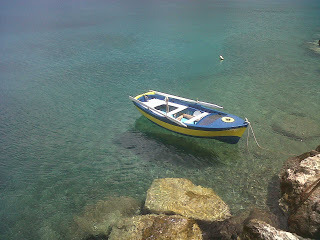
While hunting for information online, I found an entry about a Cretan song with the same lines about the leeches and the beautiful women. It’s a song from a small, traditional village called Xirosterni, or Dry Cistern. The story goes that it was named during the Ottoman occupation when a Turk demanded water from a villager, who said there was none rather than serve the enemy. Now on 6 August, a local festival takes place with Cretan music. Do you know more about any of this? Please feel free to post a comment.
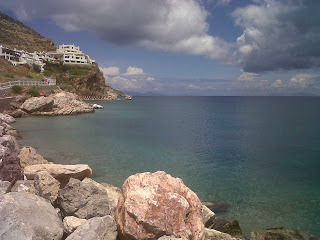
That’s all, folks. But if you’re planning a trip to Tilos this summer and would like to pick up something light to read while you’re here, then Falling in Honey: Life and Love on a Greek Island (in which there are no drinking songs) is now on sale at Mary’s Gifts on the seafront. The book is to be featured in the Mail on Sunday’s YOU magazine in mid-July.

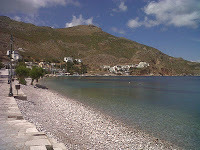
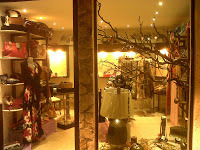
Some other random photos from this week, when we've had some clouds and rain in between hot sunshine... Isn't this lovely?
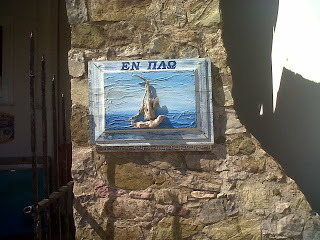
The chickens are growing...
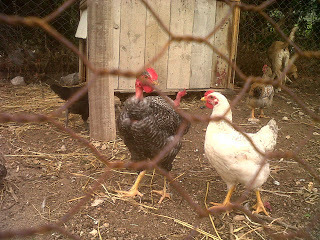
All our own: lettuce, onions, carrots, tomatoes, capers...
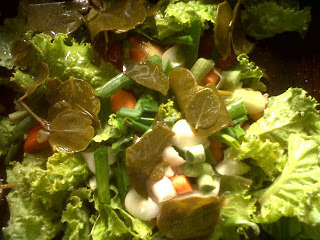
And Lisa, contemplating life and then digging for victory!
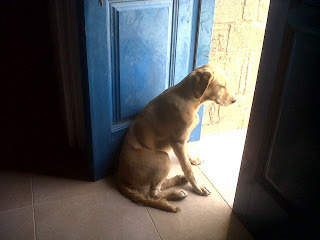
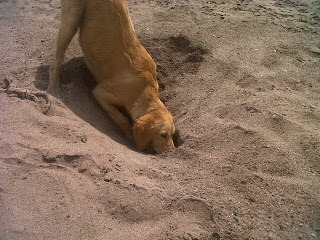
Plus - a tiny cat.
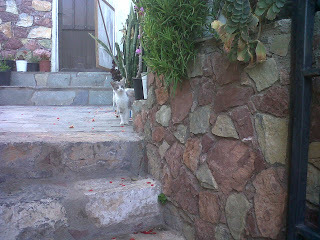
Thanks for reading, and for the messages – it’s great to hear from people all over the world.
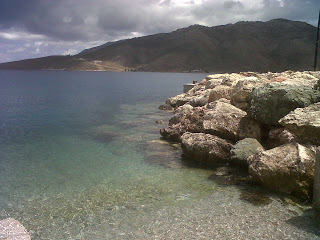
Published on May 18, 2013 22:54
Greek Drinking Songs

Sleepy this morning, after staying up late to watch Eurovision – or should I say #Eurovision, since it was the Twitter banter that made it fun. If you haven’t seen it, the video for the Greek Eurovision entry is hilarious – very different from what you’d expect. It gives a nicely irreverent image to counter what people read in the news about Greece. And unusually for Eurovision, it's not a love song but a drinking song.
[Apologies for the weird formatting issues in this post; I've tried to fix it so long it's giving me a headache. Hope it doesn't give you one.]
The video seems to have nothing to do with the title, 'Alcohol is Free', but the lyrics suggest it's all about one drunken night: the whisky's not to blame, it was the ice cubes... The band, Koza Mostra, said, 'Maybe people were drunk when they voted for us.' The moustache man, Agathonas, is a rebetiko folk singer, and those old rebetiko songs are often about intoxication of one kind or another.http://www.youtube.com/watch?v=q_xQTlRbLJY
While at our traditional Greek dance class this week, I decided to find out the words to ‘To Plataniotikio Nero’, one of my favourite dances partly because there are words in the music, and the one intriguing phrase I’d managed to decipher so far is ‘I’ll drink til I’m drunk.’ A little more sedate than Greece's Eurovision entry, ‘To Plataniotiko Nero’ is the first song in this video:http://www.youtube.com/watch?v=xX7MmJXKRZI
The song is from Samos: the singer is living away and remembering his home, wishing he had water from the village of Platanos (named after a plane tree) and wine from Kolona, an area with an ancient column, remains of a temple. Here's a link to one set of lyrics in Greek:http://www.stixoi.info/stixoi.php?info=Lyrics&act=details&song_id=746I’d translate it (with help from Stelios) as something like…
If I only had water from PlatanosWine from Kolona And if I only had my love To kiss her on the mouth
The water from PlatanosIs the pride and joy of the villageAnd whoever passes by and drinks itComes back to life
Sweet wine of SamosI’ll drink until I’m drunkSo that I don’t forget youIn the foreign lands where I now find myself
They say the water of Platanos has leeches in itBut poor as it isIt also has beautiful women
Some of the lines are repeated. For example, another version of the song has this verse:
The water of PlatanosThe water of PlatanosCures every painCures every painAnd whoever drinks itAnd whoever drinks itMarries only a Samos girlIt cures every pain
Well, I've never been to Samos, but when I do, I'll be trying some of that (I mean the wine, not marrying a Samos girl, obviously).

While hunting for information online, I found an entry about a Cretan song with the same lines about the leeches and the beautiful women. It’s a song from a small, traditional village called Xirosterni, or Dry Cistern. The story goes that it was named during the Ottoman occupation when a Turk demanded water from a villager, who said there was none rather than serve the enemy. Now on 6 August, a local festival takes place with Cretan music. Do you know more about any of this? Please feel free to post a comment.

That’s all, folks. But if you’re planning a trip to Tilos this summer and would like to pick up something light to read while you’re here, then Falling in Honey: Life and Love on a Greek Island (in which there are no drinking songs) is now on sale at Mary’s Gifts on the seafront. The book is to be featured in the Mail on Sunday’s YOU magazine in mid-July.



Some other random photos from this week, when we've had some clouds and rain in between hot sunshine... Isn't this lovely?

The chickens are growing...

All our own: lettuce, onions, carrots, tomatoes, capers...

And Lisa, contemplating life and then digging for victory!


Plus - a tiny cat.

Thanks for reading, and for the messages – it’s great to hear from people all over the world.

Published on May 18, 2013 22:54
May 13, 2013
Gather ye rigani while ye may
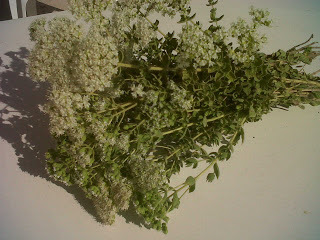
The time to gather rigani, or oregano, is when the white flowers come out, I've learned - that's when it's at its most pungent. So this week, we gather our rigani while we may - armfuls of the stuff, within a few minutes' walk from home - and hang it from the rafters of the empty building next door.
We couldn't resist gathering a last batch of capers, now filling two huge pans in the kitchen and giving off a strong smell. Thankfully, Stelios has been informed by a veteran caper-gatherer that picking it does the caper bushes good, like pruning a tree. We're already eating our first jar and it's well worth the effort.
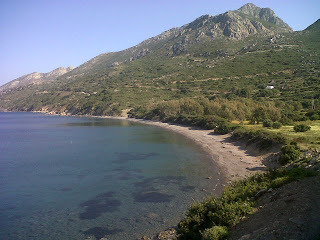
The weather this month has been heavenly, and the sea warm enough for swimming. I've taking Lisa to a beach every day. She's as much of a beach bum as I am - she loves the sea.
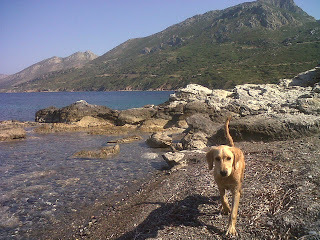
Easter felt so different this year, because it was early May rather than April; the evenings going up to the church weren't dark and cold. On Easter Sunday we ate with Stelios' relatives - a wonderful feast including roast kid with delicious rice and liver stuffing, flavoured with plenty of fresh herbs.
The priest was at lunch with us, and invited me to read out the evangelio in English that afternoon in the Sunday service, as it should be read in different languages. I immediately curbed my wine intake at lunch.
Very proud to be part of Megalo Horio's celebrations, I braved the vomves or firecrackers exploding outside like a war going on; so loud the plaster started falling from the lovely ceiling of the church, which is painted with stars. The noise drowned out the resonant words about the disciples who saw Jesus come back from the cross, and Thomas who didn't, and said he wouldn't believe until he felt the wounds with his own hands. I tried to learn about the firecrackers, but Stelios and Vicky simply said 'it's a tradition' - like the burning of the Judas.
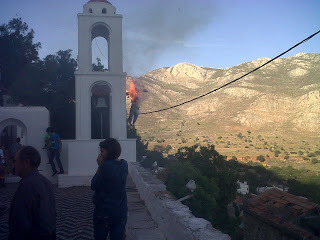
Our chickens are growing, though they seem to have developed a habit of hiding behind the coop when I arrive to feed them. This left-over spaghetti made them overcome their shyness, though.
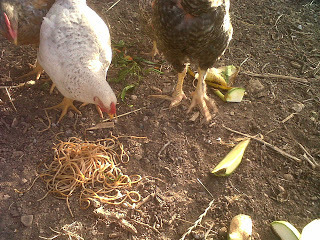
And the tomatoes are ripening.
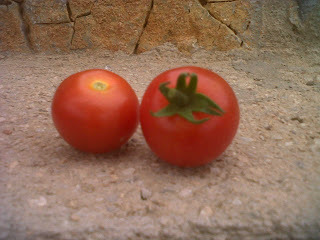
And while ye may, go marry... It's a perfect time of year for a wedding, and this Saturday was the wedding of Yota, the smiling face in the bakery, to her man from Crete - and what a spectacular evening it was up at Panayia Politissa, high on a hill overlooking Livadia bay.
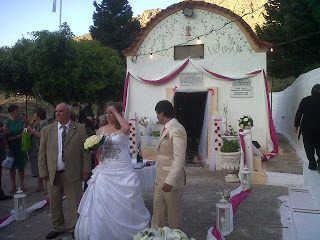
As we queued up to congratulate the newly wedded bride and groom, I suddenly forgot what it is you're supposed to say, and asked Stelios.'Na zeeseteh,' he said, and I repeated it to remember, 'Na zeeseteh' - meaning something like 'May you live long.' 'Keh tou chronou,' he continued, and again I repeated, 'Keh tou - hang on a minute!' I don't think so...He grinned. He was trying to get me to tell them, 'And do the same next year!'
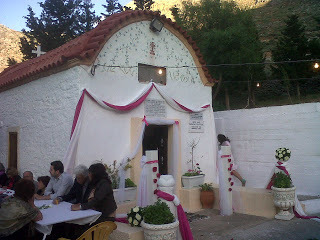
My lovely friend Eleftheria from Megalo Horio supermarket was giving out sugared almonds and heart-shaped melekounia, sweets made from sesame seeds and honey and orange.
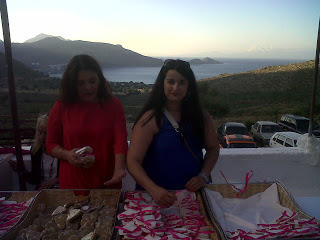
Locals, residents and regular visitors were all invited to share the food and drinks and of course the music and dancing later. Occasions like these are a great opportunity to socialise.
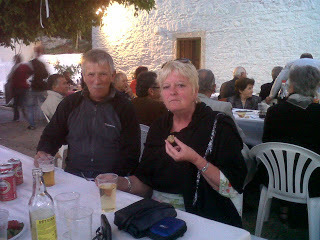
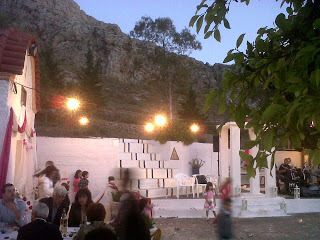
Children ran around in their best clothes throwing rose petals and moving to the music. As it got darker, the atmosphere was magical, with the rugged hilltops all around us, and the smooth still bay far below, with the lights of the village in the distance.
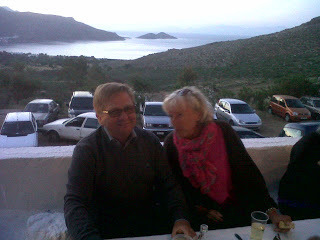
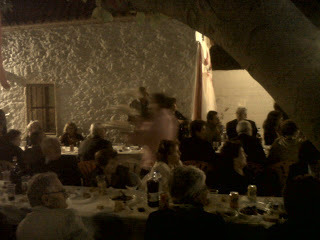
We joined in a few dances, but had to leave before midnight. As we rode the motorbike back across the island, the sky above was filled with millions of stars.
Oh, and a crazy puppy was waiting for us at home.

Published on May 13, 2013 12:23
April 30, 2013
Filoxenia: a warm welcome
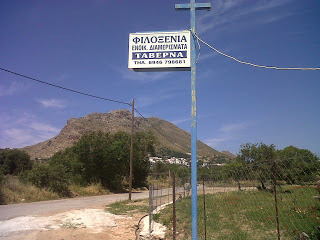
Filoxenia: hospitality, love of strangers, inviting an outsider into your home and looking after them. No wonder it's a popular name for a place to stay in Greece.
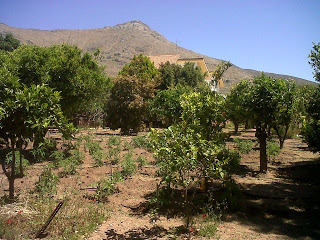
In Tilos, Filoxenia apartments are a special place to stay, yet often overlooked because they're a kilometre from the nearest beach at Eristos. A five-minute walk down from Megalo Horio village, they're right on the kampos or plain of Eristos, the most fertile part of the island, surrounded by farms.
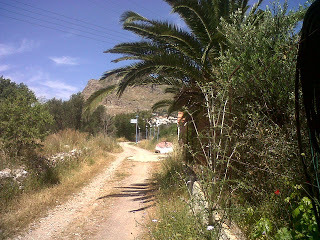
Filoxenia, set among vegetable gardens and fruit trees, was one of the places I'd stop off last summer to buy melons, tomatoes and peppers to supply the kantina. The family were so friendly and helpful. They always had a delicious-sounding menu outside for home-cooked, local food in their restaurant.
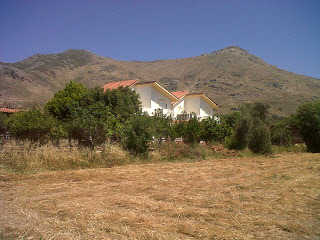
When I stopped by the other day, we chatted about the coming season and I heard the story of the live music. Apparently the family's grown-up son was practicing a classical piece on the violin one day when a group of women overheard him and wandered in. They asked if he would play again that evening. And so 17 women had dinner that night with a soloist performing Bach and Mozart for them, surrounded by lemon and orange trees in Tilos.
If people ask me about a place to stay at Eristos beach, my immediate response is Eristos Beach Hotel - because I loved staying there myself, because it has pretty gardens and cute cats, because the family are so laid-back and most of all because of Maria's moussaka. I forget to mention Nitsa apartments, attached to En Plo restaurant (very popular with locals), also set back from Eristos Beach. Lisa and I walked past yesterday and their gardens were looking so attractive already...
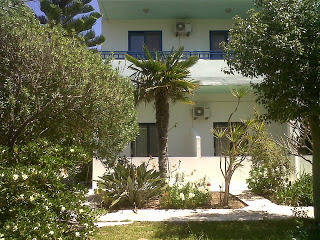
On a slightly different note: Filoxenia is a concept so central to Greek custom and tradition that the world was shocked in April by the incident at Manolada in mainland Greece, which has come to be known as 'blood strawberries', when a farmer with a gun opened fire on a gathered mass of immigrant workers demanding their overdue pay. The episode cast a hideous light on the shameful rise of racism since austerity measures made life so difficult for so many Greeks (overdue pay being the rule rather than the exception these days), and perhaps it shocked people enough to have, in the long term, a positive impact.
It seemed to me, therefore, the right time to give thanks to the generous people of Tilos for being so welcoming to outsiders. British, Italian, German, French, Dutch, Danish, Russian, Ukrainian, Bulgarian, Albanian - I'm sure I'm missing a few nationalities but you get the picture - all of us have come to settle here and been accepted, while others from Asia and Africa have worked here for a season or so, and all have made local friends and found a place in the community.
It was a few years ago that dozens of illegal immigrants from Afghanistan, Palestine and Pakistan were left on the island with practically nothing, apparently by human traffickers using a Turkish boat. These islands in the east Aegean are one of the easiest borders to breach for those desperate to reach a new life in Europe. The unconventional arrivals were treated with friendly respect, according to accounts of those who were there; by Tilos' long-serving mayor, the late Tassos Aliferis (himself an outsider who made his home on the island) as well as other islanders. A few of the young boys from the Middle East ended up staying and working hard to become part of the funny old melting pot that is Tilos.
It's the first of May, the official start of summer in Greece, and it's also Greek Easter week. Kali Protomayia, happy First of May. The island is already beginning to buzz with people who've come to celebrate Easter. It feels like it's already summer - we've had 30-degree temperatures this week, and have been swimming. The sea's been so calm and clear you can see the fish. It's a warm welcome to summer this morning. Glad I'm here to stay. Thanks, Tilos.
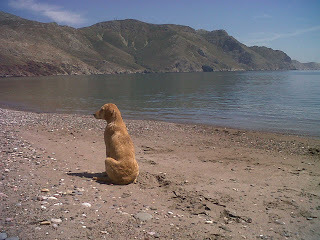
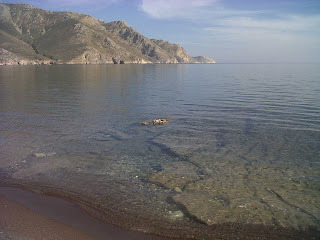
Published on April 30, 2013 23:21
April 28, 2013
Dangerous Capers
Last weekend we decided to go caper-gathering. Capers are one of my favourite things to add to salad to give it a special zing. Here in Tilos, as in many Aegean islands, it's not just the little round buds and berries but also the young stalks and leaves that are pickled, which makes sense as they're just as succulent and tasty (not to mention easier to eat).
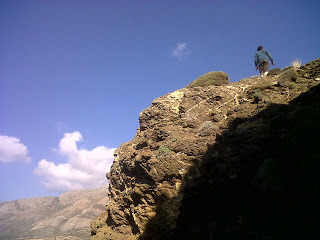
Late April is the time to pick them, after the rains of spring. Kapari (Capparis spinosa) grows mostly on cliffs overlooking the sea. The trick is to find a place where they haven't already been picked by someone else, or eaten by hungry goats. Goats are rather more nimble at scrambling down cliff-faces than humans, and cliffs here can crumble away as you make your way up or down.
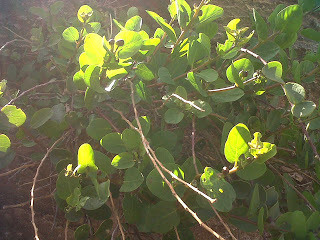
Every now and then I'd spot a huge bush of bright green leaves halfway down an impossibly steep cliff, and think of Shakespeare's samphire-gatherers on the cliffs of Dover ('how fearful and dizzy 'tis... dreadful trade!'). After a few scratches, I played it safe. I couldn't bear to watch Stelios reaching just a teeny bit further... 'I came here to gather kapari,' he grinned, 'so I'm going to gather kapari!' Stubborn?
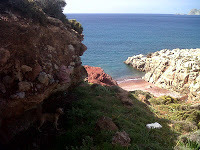
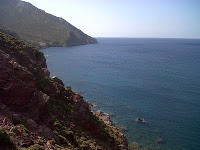
We came home with a few jars' worth. Then later this week, while walking the dog, I found another cache and we gathered some more. We left them in water for five days, changing the water twice a day, which removes bitterness. The smell that comes off them as you change the water is distinctive, not unpleasant. At first we soaked them in tap water, but then changed to using sea water.
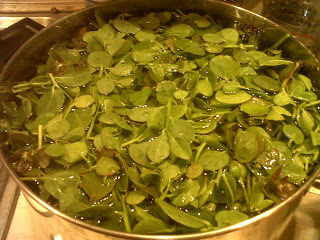
Then we put them in old honey jars with a mix of brine and vinegar, and after a few days they turn a duller shade of green and are ready to eat. We tasted them yesterday and they're delicious: our own Tilos capers. Not sure how long they will last in our house...
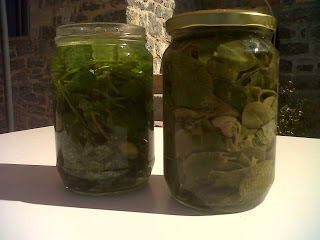
Capers have been used in Aegean kitchens since ancient times. I read that in Santorini they're stewed with tomatoes and onions and spooned over fava or yellow split-pea puree, which sounds heavenly. And there's also a Cycladic caper salad where they're combined with potatoes, or you can eat them with fish. But now that we're picking onions, lettuce, rocket and carrots from our garden, for now this lazy cook will be putting them in the salad.
Well, it's about time to go outside and take Lisa the pup for a stroll. Walking with Lisa these days is giving me a new appreciation for the number of dead lizards to be found at the roadside - though we also have an abundance of live ones, including this fellow who graced our bathroom window.

We'll go to feed the chickens, and probably along the way we'll see some goats with their youngsters. Lisa's about the same size as a baby goat right now. The other day a few big elder goats with beards and horns gathered around and took a good look at her, before turning away, as if to say, 'Naah, not one of ours...'
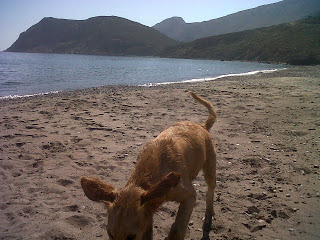
Talking of goats, this time of year is also when the islanders make the fresh mizithra cheese. I am a huge fan of cheese, but this has more of a set-yoghurt texture and is, well, extremely goaty. It's an acquired taste, and I haven't yet had time to acquire it, as Stelios eats the whole half-kilo on its own in two days flat, with a spoon. I could have taken a picture at the halfway point but it wasn't pretty. It's the one time when I am delighted for him to smoke a cigarette after eating before he comes close.
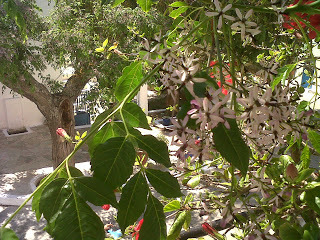
Easter-flowering plant outside the Tilos Elephant Museum in Megalo Horio: smells like jasmine
This morning is a special one, as two years ago it was the first morning of my new life in Tilos. So I may have to celebrate with a swim. I will take the precaution of putting my shoes and clothes into my bag so Lisa doesn't take them away somewhere. A lovely acquaintance who visits Tilos every year wrote me a letter recently with some 'words of warning' - oh dear, I thought, what?
She had read that Lisa was friends with the floppy-eared dog from Livadia, and worried our pup might pick up some bad habits from him. Apparently on more than one occasion old Floppy Ears pinched items of clothing from people when they went for a swim, and went hurtling off down the sea front with whatever he found - for which behaviour he earned the name 'The Underpant Dog'.
For now there's no-one on our nearby beaches, but if any socks go missing this summer, well, you have been warned...
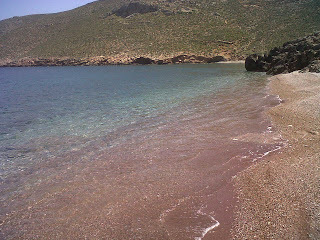

Late April is the time to pick them, after the rains of spring. Kapari (Capparis spinosa) grows mostly on cliffs overlooking the sea. The trick is to find a place where they haven't already been picked by someone else, or eaten by hungry goats. Goats are rather more nimble at scrambling down cliff-faces than humans, and cliffs here can crumble away as you make your way up or down.

Every now and then I'd spot a huge bush of bright green leaves halfway down an impossibly steep cliff, and think of Shakespeare's samphire-gatherers on the cliffs of Dover ('how fearful and dizzy 'tis... dreadful trade!'). After a few scratches, I played it safe. I couldn't bear to watch Stelios reaching just a teeny bit further... 'I came here to gather kapari,' he grinned, 'so I'm going to gather kapari!' Stubborn?


We came home with a few jars' worth. Then later this week, while walking the dog, I found another cache and we gathered some more. We left them in water for five days, changing the water twice a day, which removes bitterness. The smell that comes off them as you change the water is distinctive, not unpleasant. At first we soaked them in tap water, but then changed to using sea water.

Then we put them in old honey jars with a mix of brine and vinegar, and after a few days they turn a duller shade of green and are ready to eat. We tasted them yesterday and they're delicious: our own Tilos capers. Not sure how long they will last in our house...

Capers have been used in Aegean kitchens since ancient times. I read that in Santorini they're stewed with tomatoes and onions and spooned over fava or yellow split-pea puree, which sounds heavenly. And there's also a Cycladic caper salad where they're combined with potatoes, or you can eat them with fish. But now that we're picking onions, lettuce, rocket and carrots from our garden, for now this lazy cook will be putting them in the salad.
Well, it's about time to go outside and take Lisa the pup for a stroll. Walking with Lisa these days is giving me a new appreciation for the number of dead lizards to be found at the roadside - though we also have an abundance of live ones, including this fellow who graced our bathroom window.

We'll go to feed the chickens, and probably along the way we'll see some goats with their youngsters. Lisa's about the same size as a baby goat right now. The other day a few big elder goats with beards and horns gathered around and took a good look at her, before turning away, as if to say, 'Naah, not one of ours...'

Talking of goats, this time of year is also when the islanders make the fresh mizithra cheese. I am a huge fan of cheese, but this has more of a set-yoghurt texture and is, well, extremely goaty. It's an acquired taste, and I haven't yet had time to acquire it, as Stelios eats the whole half-kilo on its own in two days flat, with a spoon. I could have taken a picture at the halfway point but it wasn't pretty. It's the one time when I am delighted for him to smoke a cigarette after eating before he comes close.

Easter-flowering plant outside the Tilos Elephant Museum in Megalo Horio: smells like jasmine
This morning is a special one, as two years ago it was the first morning of my new life in Tilos. So I may have to celebrate with a swim. I will take the precaution of putting my shoes and clothes into my bag so Lisa doesn't take them away somewhere. A lovely acquaintance who visits Tilos every year wrote me a letter recently with some 'words of warning' - oh dear, I thought, what?
She had read that Lisa was friends with the floppy-eared dog from Livadia, and worried our pup might pick up some bad habits from him. Apparently on more than one occasion old Floppy Ears pinched items of clothing from people when they went for a swim, and went hurtling off down the sea front with whatever he found - for which behaviour he earned the name 'The Underpant Dog'.
For now there's no-one on our nearby beaches, but if any socks go missing this summer, well, you have been warned...

Published on April 28, 2013 01:16
April 19, 2013
A handful of Greece-related books (and one not)
With my editor's hat on (and I will never, ever reveal what an editor's hat looks like, as it is very silly... see below*), I was reading a US publishing newsletter the other day and saw that there were not one but two new books being planned about cooking with 'the new superfood' Greek yoghurt.
Well, it's always good to have an excuse to eat more Greek yoghurt, though I'm not convinced of the need to cook with it when you can just eat it with honey. Or make tzatziki.
Tzatiki for you to say! you may retort. Or perhaps you may not, but that leads me nicely to my next point, as it is the title of a completely enjoyable book I purchased recently, written by Rhodes resident John Manuel. He and his half-Greek wife have lived on the island for many years, and the book has true warmth and depth of knowledge; although each of the chapters is a stand-alone piece rather than part of a bigger story, you build up a picture of what life can be like in a quiet spot on the island.

I learned such nifty tricks as how to keep insects off the fruit trees, laughed out loud at descriptions of how to paint trees with lime, and got ideas of places to explore on the island. The piece that affected me most, though, was his poignant illustration of the detrimental effects of big all-inclusive hotels. I'd heard Rhodes residents talk of this before, but he showed how it affects the whole community - and the travellers too, who have a poorer experience. It's a fine book for anyone interested in Greece, has a great title of course, and the good news is that there are several other books in the series, as well as a novel, The View from Kleoboulos . And Manuel writes a blog, Ramblings from Rhodes.
Last week I finished reading a very different book, one not strictly about Greece but which partly takes place during the war in Cyprus in the 1970s. Susan Joyce, an American who lived in Cyprus and Germany and is now based in Uruguay, had a successful career as an artist and her first book, called The Lullaby Illusion (she has a website of the same name) came to me through a mutual friend who noticed we had both written travel memoirs that read a little like fiction. It turned out there were several themes in her book that really struck a chord.
Living in Kyrenia, Susan was among the group of internationals who were caught in the crossfire when war broke out in Cyprus. The account of bullets whizzing past as they hide out near the UN camp is gripping, and I certainly learned a lot. The speculation that her husband at the time might have been a double agent adds intrigue. But what I loved most about the book was Susan's spirit and her ability, in spite of the many difficulties she experienced, to see the positive and to build a new life for herself as an independent woman in Frankfurt, surrounding herself by great friends. 'I lost a child, but found myself. Went through a coup and a war. Lost everything I owned... My married died. But I survived.'
Soon after finishing that book last weekend, I had to take the long ferry journey from Athens to Tilos, and luckily managed to pick up a paperback book for my 17-hour journey: Victoria Hislop's The Thread . Most of you will already know this is her novel about Thessalonika during the first half of the 20th century. I am coming to the party a little late because I struggled to connect with her Spanish book, and it's pure luck that I found this and decided to give it a try.

It tells the stories of a small circle of people who lived through the through population exchanges that took away the Muslims and brought Greeks from Asia Minor; fires that destroyed homes and livelihoods; and German occupation during World War Two - I can hardly bear to read it at the moment as the Jewish families have been forced to leave and sent to Poland. But I'm wrapping this up now so I can finish it tonight. It is superbly written, an extraordinary work of imagination and memorable details.
But before I go, one last exciting piece of news, just in! OK, it's not a book about Greece, but Kosovo, not so very far away... Elizabeth Gowing, author of Travels in Blood and Honey , has a new book out at the end of May called Edith and I: On the Trail of an Edwardian Traveller in Kosovo . I read a couple of early chapters and it was utterly beautiful, so I can't wait to read the rest! Look it up, and pre-order - you'll be in for a treat.

Happy reading! And before I go, thank you again to all the people who continue to send lovely messages about Falling in Honey , or who have written nice reviews. I'm enormously grateful.
* sorry, but that joke made me giggle when I thought of it... I was walking back from Skafi and must have been high on the smell of wild sage
Well, it's always good to have an excuse to eat more Greek yoghurt, though I'm not convinced of the need to cook with it when you can just eat it with honey. Or make tzatziki.
Tzatiki for you to say! you may retort. Or perhaps you may not, but that leads me nicely to my next point, as it is the title of a completely enjoyable book I purchased recently, written by Rhodes resident John Manuel. He and his half-Greek wife have lived on the island for many years, and the book has true warmth and depth of knowledge; although each of the chapters is a stand-alone piece rather than part of a bigger story, you build up a picture of what life can be like in a quiet spot on the island.

I learned such nifty tricks as how to keep insects off the fruit trees, laughed out loud at descriptions of how to paint trees with lime, and got ideas of places to explore on the island. The piece that affected me most, though, was his poignant illustration of the detrimental effects of big all-inclusive hotels. I'd heard Rhodes residents talk of this before, but he showed how it affects the whole community - and the travellers too, who have a poorer experience. It's a fine book for anyone interested in Greece, has a great title of course, and the good news is that there are several other books in the series, as well as a novel, The View from Kleoboulos . And Manuel writes a blog, Ramblings from Rhodes.
Last week I finished reading a very different book, one not strictly about Greece but which partly takes place during the war in Cyprus in the 1970s. Susan Joyce, an American who lived in Cyprus and Germany and is now based in Uruguay, had a successful career as an artist and her first book, called The Lullaby Illusion (she has a website of the same name) came to me through a mutual friend who noticed we had both written travel memoirs that read a little like fiction. It turned out there were several themes in her book that really struck a chord.
Living in Kyrenia, Susan was among the group of internationals who were caught in the crossfire when war broke out in Cyprus. The account of bullets whizzing past as they hide out near the UN camp is gripping, and I certainly learned a lot. The speculation that her husband at the time might have been a double agent adds intrigue. But what I loved most about the book was Susan's spirit and her ability, in spite of the many difficulties she experienced, to see the positive and to build a new life for herself as an independent woman in Frankfurt, surrounding herself by great friends. 'I lost a child, but found myself. Went through a coup and a war. Lost everything I owned... My married died. But I survived.'
Soon after finishing that book last weekend, I had to take the long ferry journey from Athens to Tilos, and luckily managed to pick up a paperback book for my 17-hour journey: Victoria Hislop's The Thread . Most of you will already know this is her novel about Thessalonika during the first half of the 20th century. I am coming to the party a little late because I struggled to connect with her Spanish book, and it's pure luck that I found this and decided to give it a try.

It tells the stories of a small circle of people who lived through the through population exchanges that took away the Muslims and brought Greeks from Asia Minor; fires that destroyed homes and livelihoods; and German occupation during World War Two - I can hardly bear to read it at the moment as the Jewish families have been forced to leave and sent to Poland. But I'm wrapping this up now so I can finish it tonight. It is superbly written, an extraordinary work of imagination and memorable details.
But before I go, one last exciting piece of news, just in! OK, it's not a book about Greece, but Kosovo, not so very far away... Elizabeth Gowing, author of Travels in Blood and Honey , has a new book out at the end of May called Edith and I: On the Trail of an Edwardian Traveller in Kosovo . I read a couple of early chapters and it was utterly beautiful, so I can't wait to read the rest! Look it up, and pre-order - you'll be in for a treat.

Happy reading! And before I go, thank you again to all the people who continue to send lovely messages about Falling in Honey , or who have written nice reviews. I'm enormously grateful.
* sorry, but that joke made me giggle when I thought of it... I was walking back from Skafi and must have been high on the smell of wild sage
Published on April 19, 2013 09:35
April 16, 2013
Wellies on... It's Countryfile Greece
We've been talking about getting chickens for a while. I was thinking maybe two. Stelios was thinking maybe a dozen. I thought we should learn a bit about keeping chickens. Stelios figured it's easy. Three days ago, he was helping out Manolis with some work and he offered him half a dozen chickens in return. Decision made.
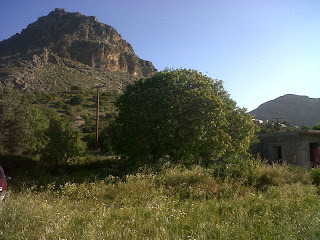
And so for the last couple of days, still exhausted after two days of hauling in over a thousand palamithes (small tuna) in the trata nets, Stelios started to build a kotetsi, a chicken house.
He'd recently spent a couple of days carefully constructing a wooden dog house for Lisa out of reclaimed wood he'd found mostly washed up on beaches, so he could build one like that. She hadn't been in there yet, but we assumed when she was old enough and it was warm enough outside...
There again, we weighed up the likelihood of this dog - who will sneak up on our bed at any opportunity - ever taking to a 'dog house'. There was more likelihood of us sleeping outside in it. Job done - one ready-made chicken house.
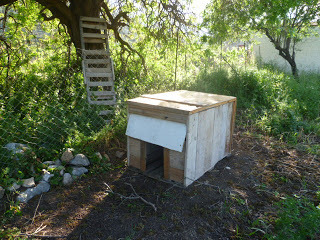
Tilos doesn't have any foxes, so there are no ground predators; but the crows and the eagles will go for a chicken, apparently, so the run had to be sealed in well overhead. And, because the chickens would be in the field where we plant all our vegetables and trees, they'd need a strong fence to keep them around their coop. He was just finishing it all off as the sun went down last night.
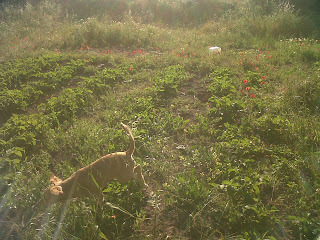
The chickens aren't new-borns so they would probably be fine overnight, but we were still a little anxious to know they'd survived the night in their new home. It was a cold, windy night (how windy? the Dodecanese Express boat managed to stop at Tilos yesterday, but broke a rope doing so, and everyone on board was sick...) So we all went down to our field en famille first thing this morning. Lisa was jumping up and down with excitement that we were all going off on an excursion together.
The chickens were as right as rain in their new home under the shade of a big old tree. And what a home! He's not just a pretty face, Mr Fisherman-Kantina-Man-Chicken-Farmer.
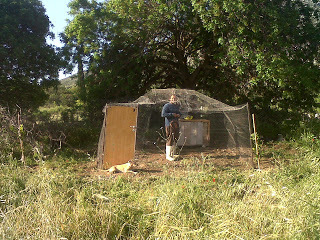
We brought Lisa inside while we fed the chickens. As long as dogs learn young, apparently, they won't harm the birds. We needn't have feared: she was more interested in eating their food.
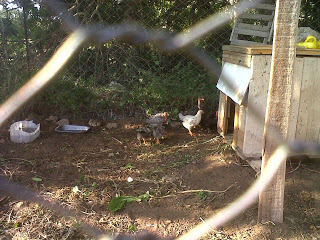
I admired the fig tree and the grape vines with their new leaves, and picked some rocket and onions and carrots from the garden for today's salad, and walked back home in my wellies. Our own fresh eggs soon? Countryfile Greece, indeed.
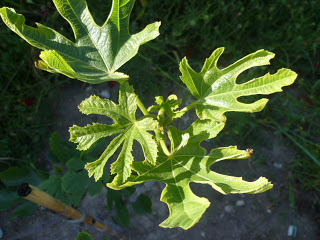
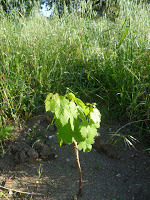
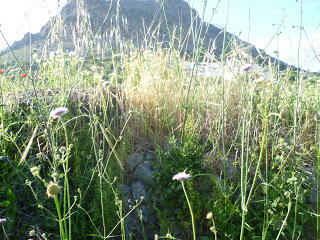
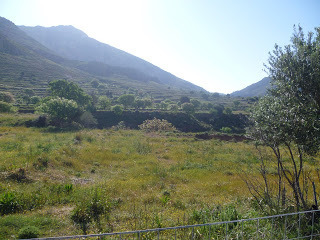

And so for the last couple of days, still exhausted after two days of hauling in over a thousand palamithes (small tuna) in the trata nets, Stelios started to build a kotetsi, a chicken house.
He'd recently spent a couple of days carefully constructing a wooden dog house for Lisa out of reclaimed wood he'd found mostly washed up on beaches, so he could build one like that. She hadn't been in there yet, but we assumed when she was old enough and it was warm enough outside...
There again, we weighed up the likelihood of this dog - who will sneak up on our bed at any opportunity - ever taking to a 'dog house'. There was more likelihood of us sleeping outside in it. Job done - one ready-made chicken house.

Tilos doesn't have any foxes, so there are no ground predators; but the crows and the eagles will go for a chicken, apparently, so the run had to be sealed in well overhead. And, because the chickens would be in the field where we plant all our vegetables and trees, they'd need a strong fence to keep them around their coop. He was just finishing it all off as the sun went down last night.

The chickens aren't new-borns so they would probably be fine overnight, but we were still a little anxious to know they'd survived the night in their new home. It was a cold, windy night (how windy? the Dodecanese Express boat managed to stop at Tilos yesterday, but broke a rope doing so, and everyone on board was sick...) So we all went down to our field en famille first thing this morning. Lisa was jumping up and down with excitement that we were all going off on an excursion together.
The chickens were as right as rain in their new home under the shade of a big old tree. And what a home! He's not just a pretty face, Mr Fisherman-Kantina-Man-Chicken-Farmer.

We brought Lisa inside while we fed the chickens. As long as dogs learn young, apparently, they won't harm the birds. We needn't have feared: she was more interested in eating their food.

I admired the fig tree and the grape vines with their new leaves, and picked some rocket and onions and carrots from the garden for today's salad, and walked back home in my wellies. Our own fresh eggs soon? Countryfile Greece, indeed.




Published on April 16, 2013 23:59
March 24, 2013
Saturday afternoon with Lisa in Tilos - photos
Published on March 24, 2013 01:12
March 17, 2013
Success can be judged in different ways
Walking the dog through the fields near our house, I’ve found a favourite place: just down the Potamia valley, covered by pine trees, are the remains of a bar that existed about ten years ago. The benches and tables are all still there, the fridges and the ‘entrance’ sign. As is the Tilos way, it’s all been left to the elements.
It’s a beautiful spot. Stelios says it belongs to his godparents, but they don’t live here now. There’s a little patch of grass where I imagine lying in summer.
Stelios remembers when it was one of three bars in Megalo Horio, and he and his friends used to go from one to the other. Now there are none, which is sad. There were more young people around ten to fifteen years ago, it was livelier.
It reminds me that the taxi run by Nikos and Toula has now shut down. They had to pay the same taxes and licence as a taxi driver on the busy island of Rhodes, making it financially unviable. So Tilos no longer has a taxi service.
We all know the signs of Greek island populations dwindling over the last half-century, and now the Greek diaspora has begun again, the economic crisis forcing people to move abroad to seek career opportunities.
The island could use a few more visitors, just as it could use a few more permanent residents, and more work. It’s good to see a new stone wall being built at the bus stop in Megalo Horio, with benches, mostly for the Russian tourists who visit the village by coach in the summer. An old workshop is being turned into a shop for traditional products. Our mayor will be able to oversee it all from her apartment window. The newly planted trees on Eristos Beach are also sprouting green growth, so there’ll be more shade for visitors this summer.
Down in Livadia, I’m saddened by the electric ‘Cretan Restaurant’ sign transforming what was lovely Irinna, but as I look down the seafront it’s hardly the only electric sign. Still, I wish they’d left it. That’s one of the reasons I love Omonia, under the trees off the square, as old-fashioned as ever year after year, with its hand-painted ‘We have a card-phone’ sign, yet constantly busy during the summer.
Some regular visitors to Tilos who remember the days when it was truly untouched are uncomfortable about developments such as high-speed internet. But unromantic as it is, I think it can help the island promote itself and flourish; promoting online is cheap. And it makes it possible for more people to live here year-round, and do simple things like check how late the big ferry from Athens is running.
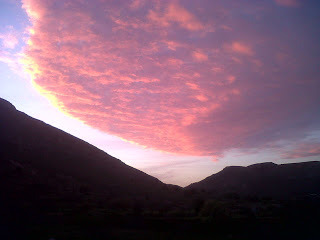
The post office was closed for a week as the man who runs it had to go away; I rushed down there when it re-opened, but still no sign of my copies of Falling in Honey.
I remember back in the autumn, a couple of friends kindly read the bookproof for me to check if I’d made any big gaffes, and they gently asked whether it would be a good idea to change the name of the island. What if the book took off and the island was overrun with Brits?! I considered, but reasoned that the few it might bring would be good people, who would help the island to retain its character and traditions. I portrayed the place as it is, and that's not everyone's cup of tea.
A couple of weeks ago, an author friend who writes for a certain large-circulation British newspaper managed to get her editor interested in doing a story on my book; focusing on the twist in the tale, when I find out that the funny, generous, loving man I’d been planning to move to Greece with wasn’t coming with me after all. It was thrilling to think of the publicity. But they wanted to identify the real ‘Matt’, and focus on that part of the story, instead of the ending that I’m proud of, coming to Tilos alone after all. So, under advisement, I said no, and felt slightly sick for doing so. It could have mean a huge leap in numbers and attention – but would it have been the right kind?
And there’s a parallel there between what an island is prepared to do to promote tourism, surely. Like an obscure book from an unknown writer, a little-known island that’s hard to get to, like Tilos, needs to work hard to spread the word that it’s open for business. It has to look after the free campers on Eristos beach as well as the high-end Russian coach parties, because every little contribution from a new face on the island helps a family business.
But you don’t sell out. You stay the way you are. We love Tilos because it’s quirky; because of the old sofa outside the petrol station that closes for lunch; because if you turn up late at Omonia, Michalis tells you you’ll have to wait a long time to eat; because if the man who runs the post office has to go away for a week, the post office is closed; because even if there isn’t a taxi, you know someone will stop and offer a lift. If all this changed and the island did something drastic to bring in scads of package tourists, even built proper roads to the secluded beaches as I’ve heard suggested at times, the rest of us wouldn’t love it any more.
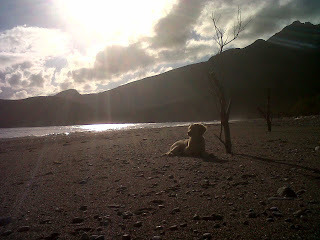
And so, happy to remain toiling in semi-obscurity myself, grateful for the kindness of friends posting reviews on Amazon and Goodreads and recommending to friends and book clubs, I’ve been writing articles and guest blog posts this week, pieces that I hope will keep the message positive. I’d love to have a successful book, but success can be judged in different ways. For an island, it’s keeping its character and still drawing tourists. For me, it’s when readers ‘get’ the book, when people see it as a message of hope, of making the most of life (because life is too short not to reach out for what makes you happy), of finding beauty in the simplest moments.
PS: I was down in Livadia last week one sunny lunchtime and talking with Lyn and Ian, and the dog was learning that cats don’t always play fair. Vassilis came over and asked the dog’s name. Lisa, I replied.
‘What, you call your dog rabies?’
It turns out leeza is how her name should be pronounced, not leessa, which does indeed mean rabies. Just as I was confused when it sounded like Stelios had been mending a leaky boat with pizza he found washed up on a beach; pissa is tar.
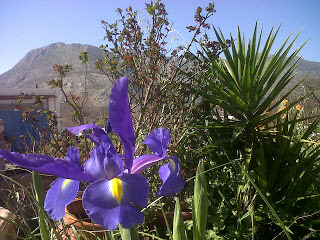
Published on March 17, 2013 03:07
March 3, 2013
Dog Class on the Diagoras
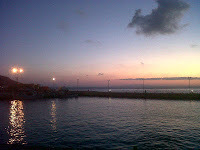 The Greeks are not known as a nation of dog-lovers, but we met a whole lot of them on Friday.
The Greeks are not known as a nation of dog-lovers, but we met a whole lot of them on Friday. It was time to take Lisa the labrador pup to the vet for her check-up. We were down at the port by 6 a.m., but the good ship Diagoras was delayed on its long journey from Athens, and daylight arrived while we waited.
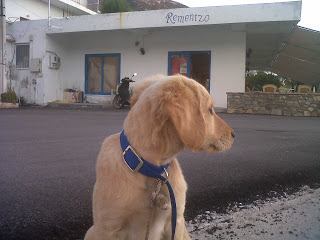
It had been an exciting week, as my book Falling in Honey is now out, and the Daily Express published a fabulous story about my move to Tilos. I was thrilled by the support of friends who helped spread the word online. But it was good to leave the computer behind for the day. I'd be spending an entire day, from dawn til midnight, with the dog. And I thought writing a book was hard work...

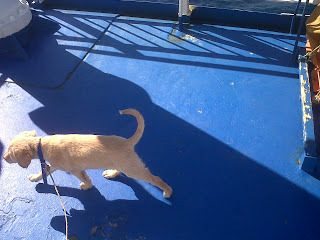
Lisa took to her first cruise quite happily - naturally, as she was a star from the moment we went up the escalators; the ship's crew were already blowing kisses at her. Up on the top deck, the only section where dogs are allowed, one of them took photos. We also met plenty of other travellers who asked to stroke her and told us about their own dogs. A little boy from Nisyros asked if he could take her for a walk around the deck.
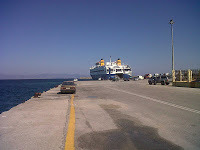
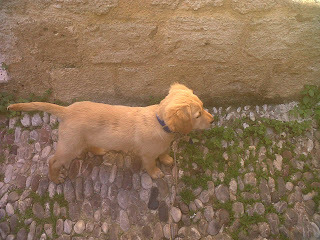
Once in Rhodes, we went to the vet, who gave her inoculations; we bought a hefty supply of bones and chews at the shop; then it was off to explore. First stop, the old town, full of interesting smells for dogs - not a fast walk, then.
We made it at last to Mandraki where I managed to shop while balancing a wriggling dog in my arms. I didn't think we'd be allowed into the smart cosmetics shop Sephora, but we almost weren't allowed to leave, so many people wanted to get to know her - giggling teenagers, pretty beauticians, the security guy. Stelios called: could I buy some screws so he could finish building the dog's new house? Of course...
I'd planned to walk her on Elli beach, but had forgotten what a long way it was, especially when we had to stop every few minutes to discuss her breed, find out where we got her. Finally, after carrying bags of shopping and an exhausted pup, I sat down on a step on a street corner with her to give her a drink and a rest, and sitting there in my hairy dog-clothes I realised people might start throwing spare change into the dog bowl. I was too tired to care.

I love Rhodes on a sunny day out of season, when you can see snow on the mountains in Turkey. We ventured back through the old town and found this lovely street, which gets packed with tourists in summer, absolutely empty now and bathed in sunshine. Exhausted, I lay down on a bench doing my homeless person act again, with the sun on my face, while Lisa devoured a chew; but soon we had company again.
It was a pleasure to meet so many nice people. I usually have my nose buried in a book. An elegant old lady in black was taking a walk down a cobbled street and chuckled at Lisa.
The ship was due to leave Rhodes for Tilos at 7 p.m., but knowing it's often delayed, I hoped to find a friendly cafe. The Technourgeio Cafe is one of my favourite places for its recycled wood decor, art on the walls and eclectic menu. It just happens to look out towards where the Diagoras docks, so it's the perfect place to wait. I hesitantly carried Lisa in my arms, asking if there was any chance we could come in...
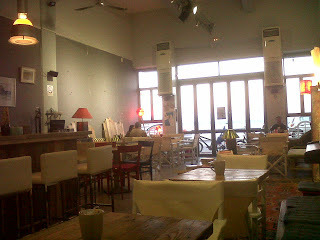
The waitress gave me a welcoming smile and told me she loved dogs, and to sit anywhere. So I got to eat, and Lisa got to sleep for a while... until we met a lovely seven year old girl who laughed when Lisa licked her face, and told me tricks I need to teach her.

Finally, it was back to the boat, to try to get a little rest up on deck. Lisa had behaved impeccably all day. Soon we were chatting with a couple of guys on leave from military service, and being introduced to beautiful huskies and other dogs with booming barks.
It was getting cold so we found a little spot just inside the door at the top of the stairs. Lisa spread herself out right in the middle so that all passers-by would be sure to see her.
We sat for a while with a young chap who'd just lost his job as a mechanic in Rhodes due to lack of business, and was heading up to northern Greece to live with his girlfriend there, grow some vegetables and start a different life. His parents in Kalymnos would be coming down to see the boat when it docked at 4 a.m., just to see him for a few minutes. As he talked, he stroked Lisa to sleep.
*
And in case you missed it, here's the link to the Daily Express story!
http://www.express.co.uk/life-style/travel/380464/I-am-a-real-life-Shirley-Valentine
Published on March 03, 2013 08:27

